Historic Strike Comes to an End
Taylor Smith | Arts & Entertainment

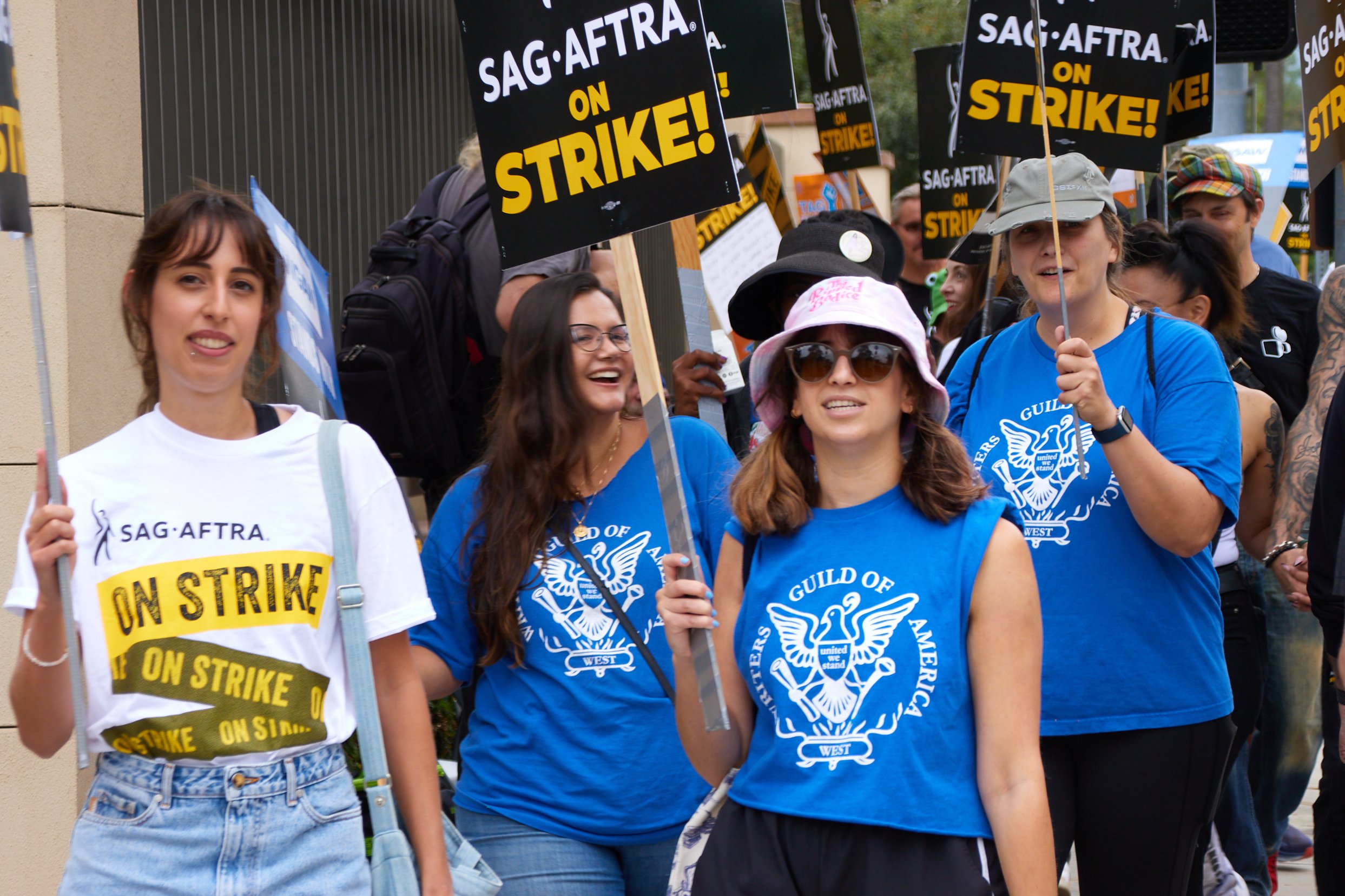
Writers from Writers Guild of America (WGA) marches alongside SAG-AFTRA members in solidarity in front of the Warner Bros. Studio, Burbank, Calif., on Sept 29, 2023. While WGA had struck a deal with the studios already earlier in the week, its members are still showing up to the SAG-AFTRA strike to support the actors. (Danniel Sumarkho | The Corsair)
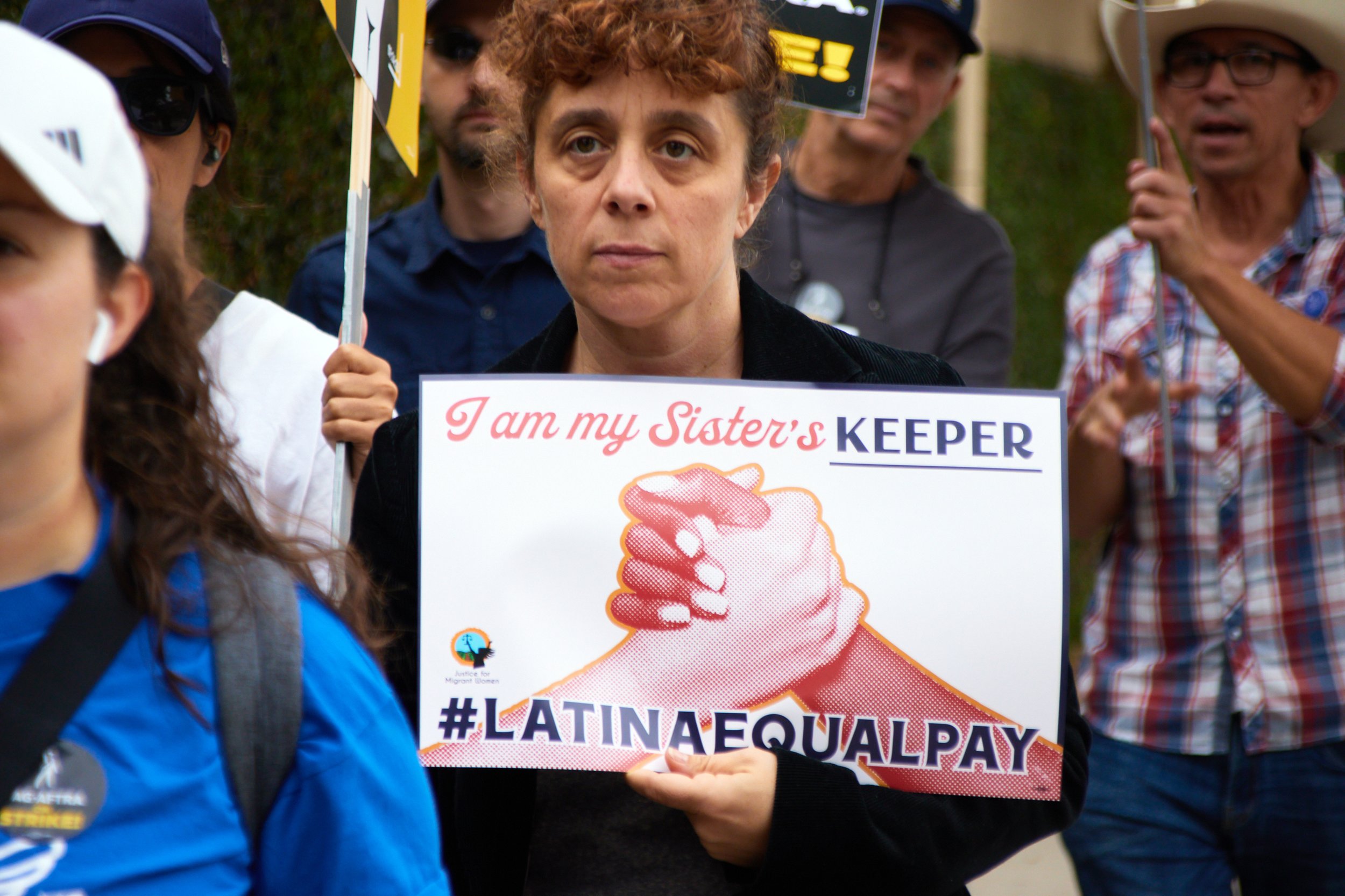
A woman holding a sign with "I am my Sister's KEEPER", "#LATINAEQUALPAY" written on alongside the "Justice for Migrant Women" logo marches alongside picketers during the SAG-AFTRA strike in front of Warner Bros. Studio, Burbank, Calif., Sept 29, 2023. (Danniel Sumarkho | The Corsair)
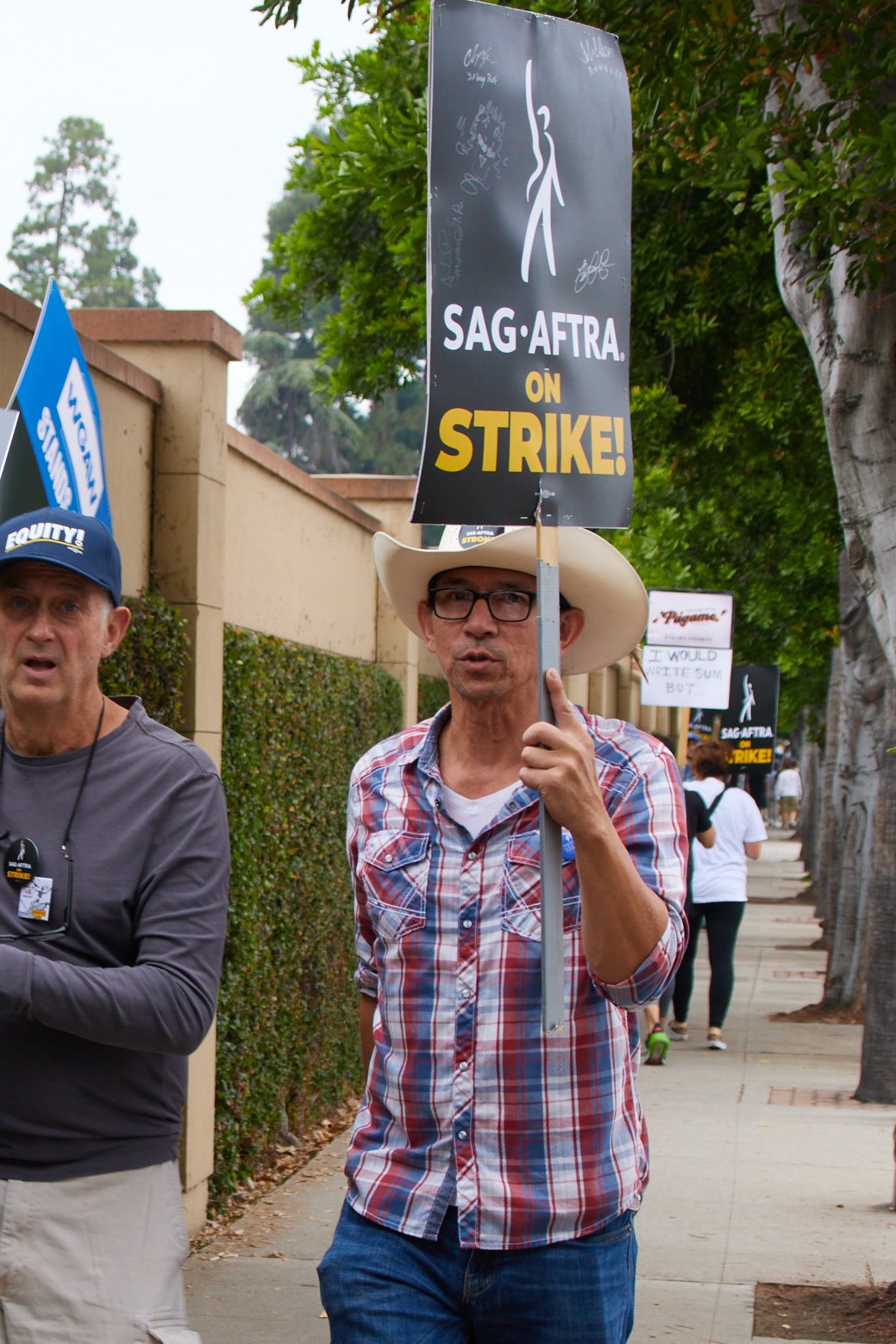
Actor John A. Lorenz marches alongside a WGA member during the SAG-AFTRA strike in front of Warner Bros. Studios, Burbank, Calif., on Sept 29, 2023. (Danniel Sumarkho | The Corsair)
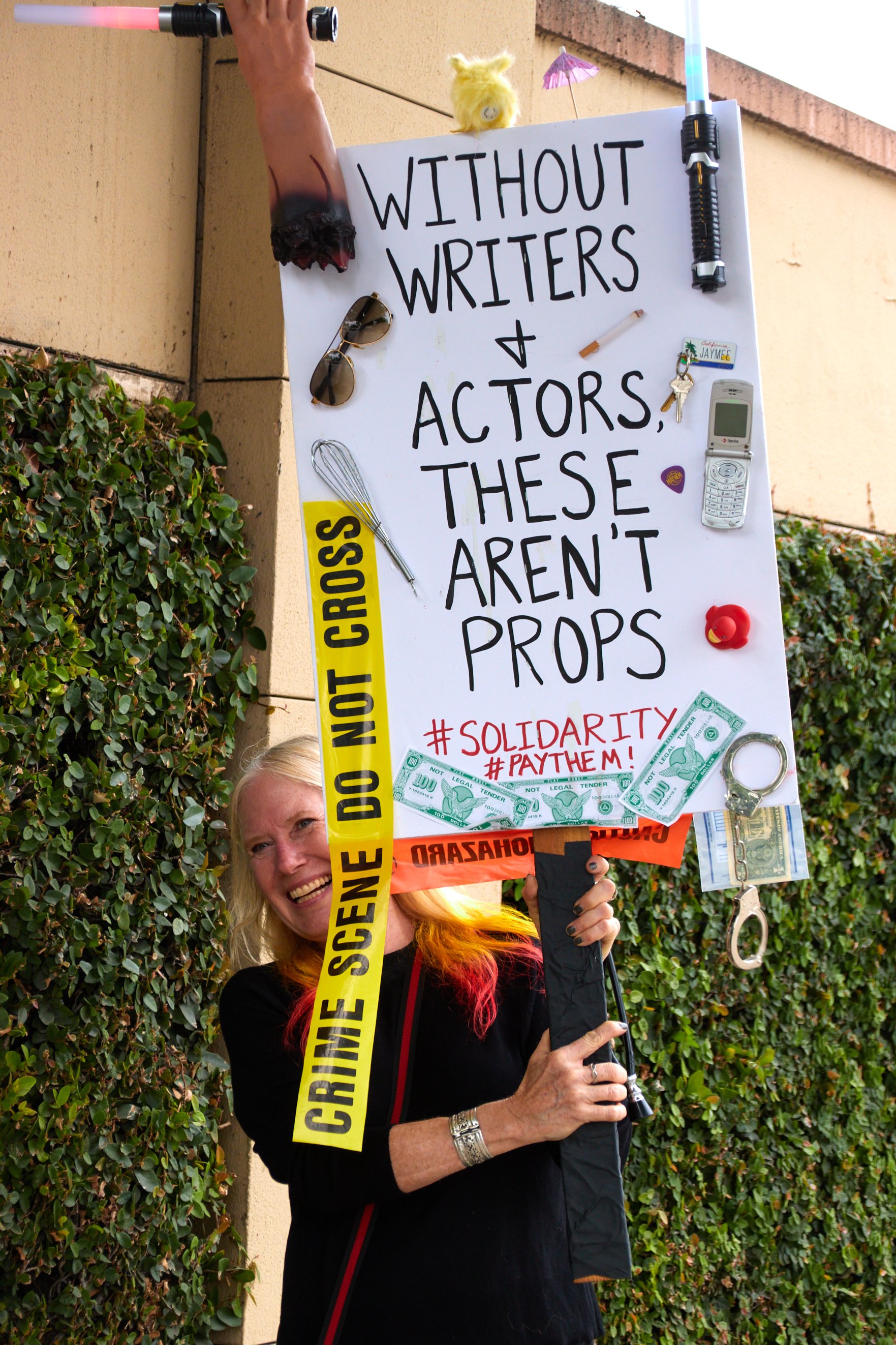
A marching picketer holds up a picket sign with various props and "WITHOUT WRITERS & ACTORS THESE AREN'T PROPS" written on it during the SAG-AFTRA strike in front of Warner Bros. Studio, Burbank, Calif., on Sept 29, 2023. (Danniel Sumarkho | The Corsair)
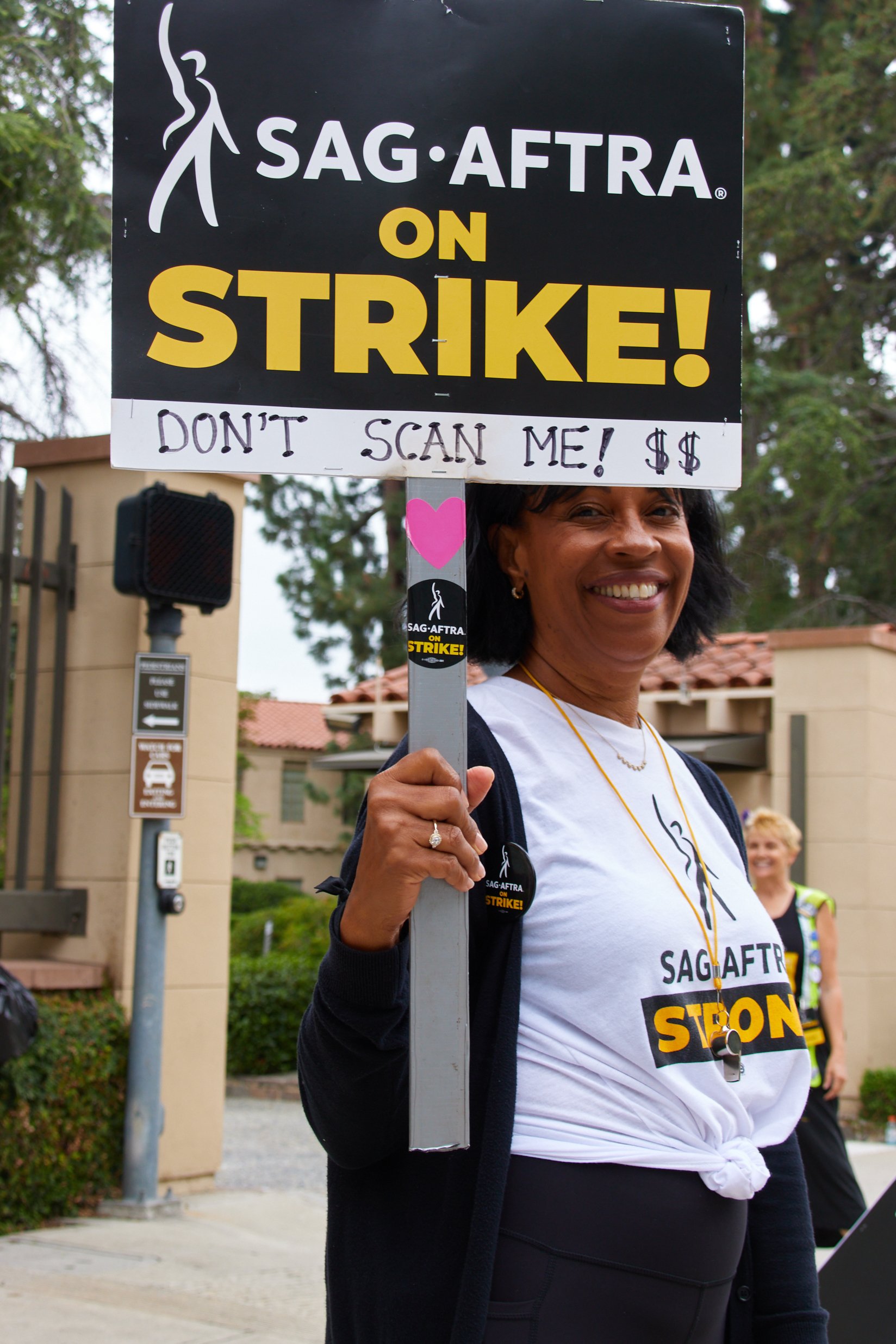
Actress and SAG-AFTRA member Melvina Strikes poses with a picket sign with "DON'T SCAN ME! $$" written on it during the SAG-AFTRA strikes in front of Warner Bros. Studios, Burbank, Calif., on Sept 29, 2023. She had played a background character in the Marvel show "Wandavision", but they had scanned her likeness to reinsert her into future scenes without compensating her. "They even changed my clothes," Melvina exclaimed. (Danniel Sumarkho | The Corsair)

Andy, a dog, with his owner at the SAG-AFTRA strike in front of Warner Bros. Studio Gate 3, Burbank, Calif., on Sept, 29, 2023. (Danniel Sumarkho | The Corsair)
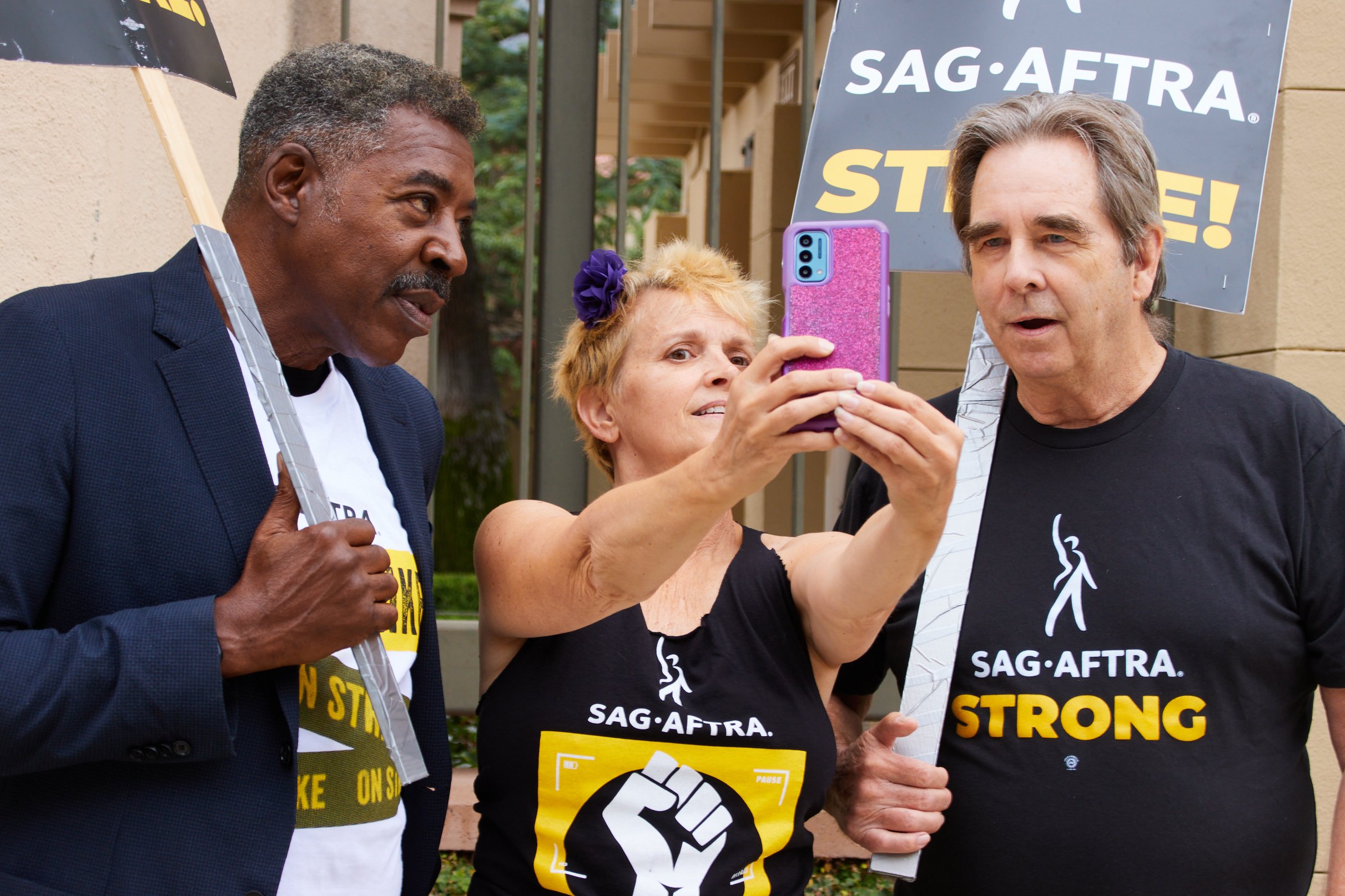
Actors Ernie Hudson, Emelle, and Beau Bridges, left to right, recording a video together during the SAG-AFTRA strike in front of Warner Bros. Studio, Burbank, Calif., Sept 29, 2023. (Danniel Sumarkho | The Corsair)
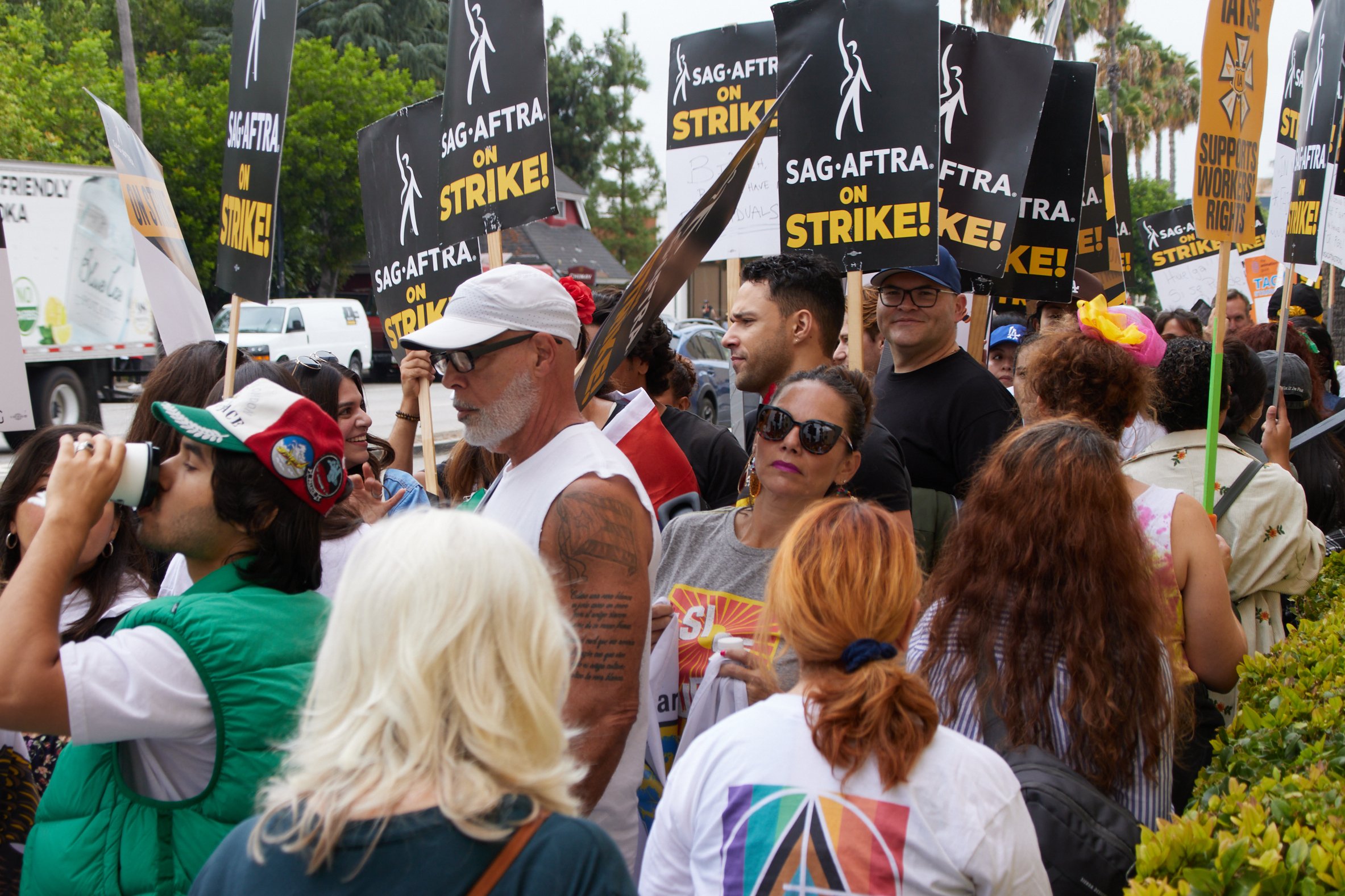
A crowd of picketing SAG-AFTRA members gathered in wait for the traffic light to change to walk across the street in front of Warner Bros. Studios Gate 3, Burbank, Calif., during the SAG-AFTRA strike on Sept 29, 2023. (Danniel Sumarkho | The Corsair)
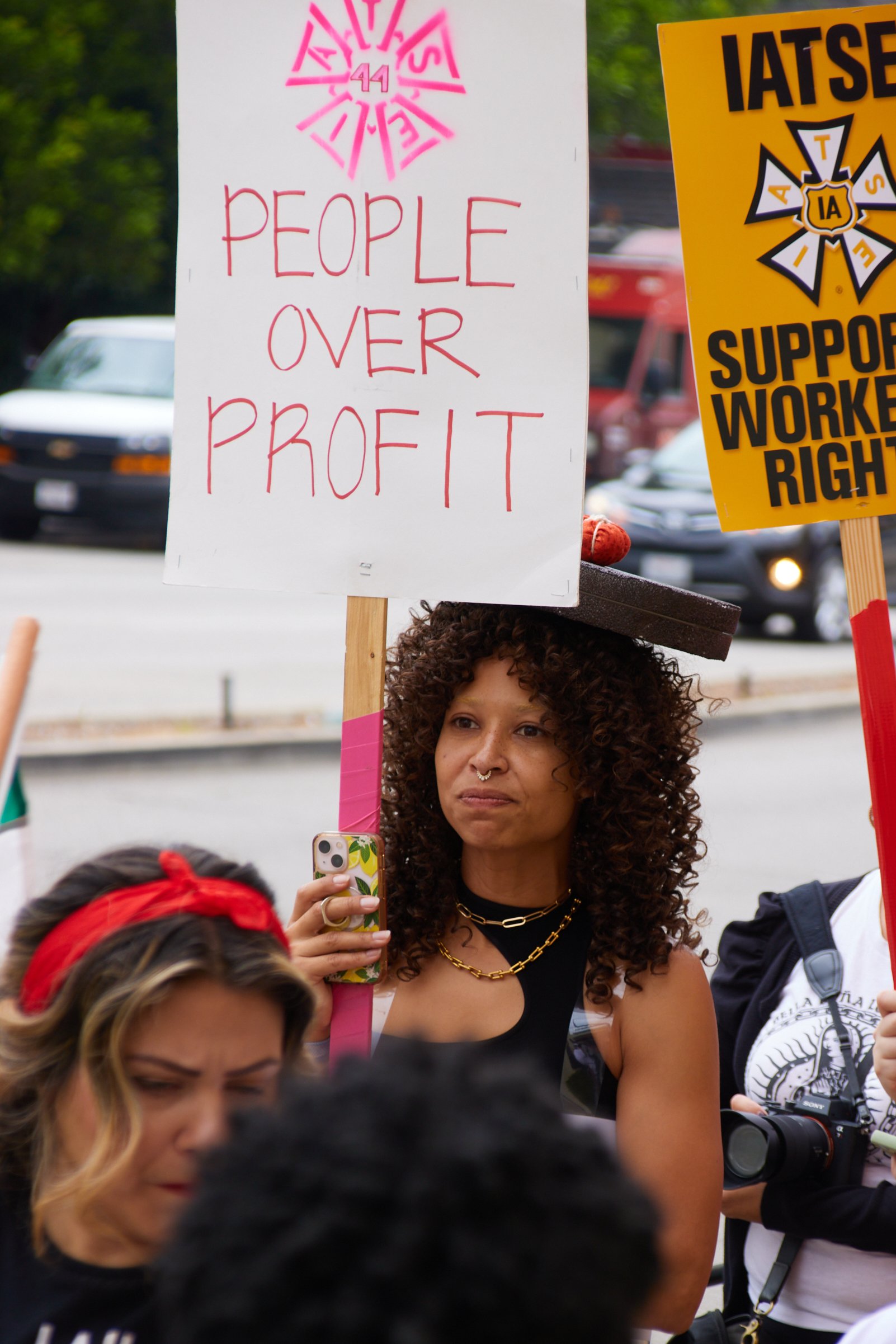
An IATSE member holding up a sign with "PEOPLE OVER PROFIT" written on and IATSE 44 logo marches in solidarity alongside SAG-AFTRA members during the SAG-AFTRA strike in front of Warner Bros. Studio Gate 3, Burbank, Calif., on Sept 29, 2023. (Danniel Sumarkho | The Corsair)

Actor Tim Brehmer, donned in a Mandalorian costume, marches during the SAG-AFTRA strike in front of Warner Bros. Studio, Burbank, Calif., on Sept 29, 2023. (Danniel Sumarkho | The Corsair)











Writers are throwing out their walking shoes and preparing to return to work as the Writers Guild of America strike comes to a close.
It has been a grueling 148 days for Writers Guild of America (WGA) members this summer on the picket lines during the second-longest writers’ strike in history. After racking up thousands of steps daily, marching alongside the Screen Actors Guild– American Federation of Television Artists (SAG-AFTRA), the WGA has finally reached an agreement with the Alliance of Motion Pictures and Television Producers (AMPTP).
“We’re incredibly proud of the deal that we earned. With gains in streaming, increases in wages, and protections against AI, writers in every sector of the business are excited about what we achieved together,” stated Travis Donnely, a WGA member and board member, in a follow-up with The Corsair.
After much back and forth, the AMPTP and industry leaders sat down with the WGA negotiators and presented their “last and final offer” as scribes across the country held their breath awaiting the outcome.
Co-founders of Dean’s Coffee, a small business which serves coffee to picketers on the line, Andrea Alba-Von Buren and Oliver Alerte were among those eager to see a deal made.
“Like many, we understood what was at stake and that it would take a lot of sacrifice to get it done, but it would ultimately be worth it. We were right,” the entrepreneurs said in a joint statement.
The WGA struck a tentative agreement with the AMPTP on Sunday stating, “This deal is exceptional—with meaningful gains and protections for writers in every sector of the membership.” The board and council voted on Tuesday to authorize the contract and end work stoppage as of 12:01 a.m. on Wednesday.
Through negotiations, the WGA has hit the mark on the major terms they have been vocal about seeking during their fight.
Beyond a standard raise, a “success-based bonus” was secured for made-for-streaming films and shows, as well as an increase in foreign residuals. In addition, the studios have agreed to streaming data transparency, both domestically and internationally, contingent upon a confidentiality agreement.
A groundbreaking addition to the agreement includes its restrictions on artificial intelligence (AI). AI will not be permitted to write literary material and essentially replace the job of a writer, nor can its use be required when providing writing services.
“Unfortunately, it didn’t come without pain. Writers traded their offices and laptops for the uncertainty of a picket line for 148 days. It was hard and even scary, but we never wavered,” continued Donnely.
Writers are now dusting off those laptops and gearing up to get back to work. But while the finalization of this new contract between the WGA and AMPTP is a major step for labor unions, the fight is not over.
The WGA deal will now stand as a bargaining tool for the actors’ union, who recently voted on Sept. 25 to issue a strike against videogame companies as well if their Interactive Media Agreement negotiations fail.
“We are still out there in the SAG-AFTRA picket lines for now, so we’re not quite done yet, but we offer the WGA our heartfelt congratulations on this feat achieved by the unity and sacrifice of its members and everyone
who honored the picket lines, and our most sincere thank you for welcoming us into their lines and supporting us every step of the way,” expressed Al- ba-Von Buren and Alerte.
SAG-AFTRA will now meet with the studios to continue their own negotiations on Monday, Oct. 2. Until an agreement is made, actors will remain on the picket lines. In their statement, the WGA encouraged its members to continue supporting actors out on the line.
“The next day, I saw them back out walking with us too,” said actress Am- ber Martinez on the lines. “We support each other. Everyone deserves to survive in this town.”
While the road to a fair deal was a long one, Donnely could not be proud- er of what his guild has accomplished.
“Writers reached a crossroads where our livelihoods were at stake, not just in our industry but also in the broader picture of labor in America, and our union met the moment and stood in solidarity, with a passion and resolve that could not be denied,” Donnely stated.
RUBBERBAND dance group combines a fusion of hip-hop, ballet and contemporary dance, and performed at BroadStage on March 8 and 9.
The Artist’s Gallery spotlighted artists at their awards and reception night for the “Imaginations” and “Earth, Wind, Fire and Water” exhibits.
Battleship USS IOWA held a Rock For Responders concert to honor Los Angeles first responders for putting their lives on the line every day.
The BroadStage will be presenting three concerts coming up on Jan 25, 26, and Feb 1. Throughout the first weeks of the new year, the city of Los Angeles has faced much destruction and loss. These concerts are offering a way for Angeleno’s to heal with music and art, entry starting at $0– pay with what you wish tickets.
The SMC student musicians highlighted their various talents and expressed love for their labor.
While the Luna Luna art amusement park has closed in Los Angeles, it is not forgotten this time.
Controversy strikes as Beyoncé’s upcoming anticipated country album “Act II: Carter Cowboy” approaches.
A new series based on the novel “Chasing Hillary” introduces a new take on journalists on TV.
The lights go up on stage, and magic ensues as Dr. Adrianne Harrop’s production of “Sherwood: The Adventures of Robin Hood” continues to create lasting memories not only for production members but also for those who watch.
The Most Comprehensive International Contemporary Art Show in America
Rivera believes that while we might not always be able to change minds, we can try and change hearts.
Dive into the world of The Hunger Games in this two-part discussion of the franchise’s new prequel movie, The Ballad of Songbirds and Snakes.
Get Ready for the holiday season with The Corsair as we discuss our favorite and least favorite Christmas films!
The Theater Department puts on an incredible rendition of Avenue Q.
The actors’ strike comes to a close, and industry professionals navigate what is next for the ever-changing industry.
The Corsair editors behind the coverage of the Santa Monica College Theatre Arts department production “By The River Rivanna” talk about the behind-the-scenes reporting on the controversy.
Journalists from The Corsair review DPR IAN’s recent album drop in the storyline of The Other Side.
Journalists from The Corsair review Bad Bunny’s latest album “nadie sabe lo que va a pasar mañana.”
Journalists from The Corsair review the R&B album “Falling or Flying” by Jorja Smith.
Stand-up comedian and former NBC weathercaster Fritz Coleman retiring from tv and premiering a new show on Tubi.
Global Motion World Dance Company took over BroadStage in Santa Monica on Nov. 18.
This Fall, the Craig Krull Gallery in Santa Monica presented an exhibition titled “Phranc: The Butch Closet'' featuring a Jewish lesbian sculptor and folk singer-songwriter, Susan Gottlieb, known by the pseudonym “Phranc.”






















